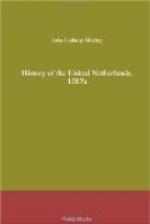“All your friends do see,” said Otheman, “that this disgrace is not meant so much to me as to your Excellency; the Dutch Earls having used such speeches unto me, and against all law, custom, and reason, used such violence to me, that your Excellency shall wonder to hear of it.”
Now the Princess Chimay, besides being of honourable character, was a sincere and exemplary member of the Calvinist church, and well inclined to the Leicestrians. She was daughter of Count Meghem, one of the earliest victims of Philip II., in the long tragedy of Netherland independence, and widow of Lancelot Berlaymont. Count Moeurs was governor of Utrecht, and by no means, up to that time, a thorough supporter of the Holland party; but thenceforward he went off most abruptly from the party of England, became hand and glove with Hohenlo, accepted the influence of Barneveld, and did his best to wrest the city of Utrecht from English authority. Such was the effect of the secretary’s harmless gossip.
“I thought Count Moeurs and his wife better friends to your Excellency than I do see them to be,” said Otheman afterwards. “But he doth now disgrace the English nation many ways in his speeches—saying that they are no soldiers, that they do no good to this country, and that these Englishmen that are at Arnheim have an intent to sell and betray the town to the enemy.”
But the disgraceful squabble between Hohenlo and Edward Norris had been more unlucky for Leicester than any other incident during the year, for its result was to turn the hatred of both parties against himself. Yet the Earl of all men, was originally least to blame for the transaction. It has been seen that Sir Philip Sidney had borne Norris’s cartel to Hohenlo, very soon after the outrage had been committed. The Count had promised satisfaction, but meantime was desperately wounded in the attack on Fort Zutphen. Leicester afterwards did his best to keep Edward Norris employed in distant places, for he was quite aware that Hohenlo, as lieutenant-general and count of the empire, would consider himself aggrieved at being called to the field by a simple English captain, however deeply he might have injured him. The governor accordingly induced the Queen to recall the young man to England, and invited him— much as he disliked his whole race—to accompany him on his departure for that country.
The Captain then consulted with his brother Sir John, regarding the pending dispute with Hohenlo. His brother advised that the Count should be summoned to keep his promise, but that Lord Leicester’s permission should previously be requested.
A week before the governor’s departure, accordingly, Edward Norris presented himself one morning in the dining-room, and, finding the Earl reclining on a window-seat, observed to him that “he desired his Lordship’s favour towards the discharging of his reputation.”
“The Count Hollock is now well,” he proceeded, “and is fasting and banqueting in his lodgings, although he does not come abroad.”




